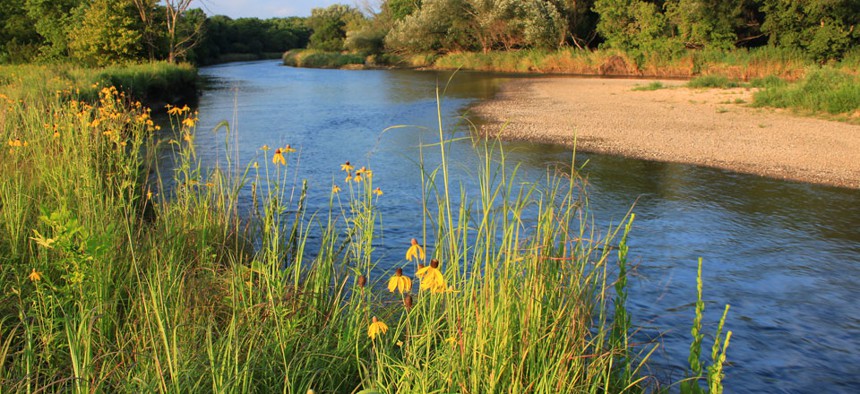
The Kishwaukee River flows through western Illinois. Jason Patrick Ross/Shutterstock.com
EPA Stakes Out Authority Over Waterways
New rules clarify streams and wetlands under the agency's jurisdiction.
The Environmental Protection Agency wants you to know exactly which waterways it plans to protect.
The agency floated draft rules Tuesday to define the bodies of water protected under the Clean Water Act. The rule brings the majority of U.S. streams and wetlands under EPA's jurisdiction. This means that any non-exempt activity with the potential to pollute protected waterways must first earn the agency's stamp of approval.
EPA says the standards will clarify its existing authority to protect water supplies, but the regulation is sure to prompt pushback from conservatives and agricultural sector stakeholders who have previously criticized the rulemaking as federal overreach.
EPA Administrator Gina McCarthy took pains to ward off criticism ahead of the rule's release. "This rule does not expand the Clean Water Act," McCarthy said during a press call with reporters. "I repeat it does not protect any new types of water that have not historically been covered under the Clean Water Act."
The regulation also includes a roster of exemptions. McCarthy touted this feature of the rulemaking, saying it will make life easier for farmers. "The rule keeps intact existing Clean Water Act exemptions for agricultural activities, [and] it actually expands those exemptions," the administrator said. "This is about streamlining the process and saving money. We're providing certainty about what's in and what's out."
The standards drew quick praise from environmental heavyweights and sportsmen's groups alike.
"The Sierra Club applauds the Obama administration for this effort to restore a common-sense approach to protecting our nation's lakes, rivers and streams. Clean water is an undeniable necessity for the health of our families, our environment, and our economy," Michael Brune, the club's executive director Club, said.
"The waters affected by today's proposal provide vital spawning and rearing habitat for trout and salmon. Simply stated, the proposal will make fishing better, and anglers should support it," said Trout Unlimited president and CEO Chris Wood.
EPA has been working to clarify its Clean Water Act authority after Supreme Court rulings handed down in 2001 and 2006 raised questions as to just how far agency protections extended. The proposed regulation unveiled this week—commonly known as the "waters of the United States" rule—was delivered to the White House for review last September. It will be subject to a 90-day public-comment period after it appears in the Federal Register.
(Image via Jason Patrick Ross/Shutterstock.com)







